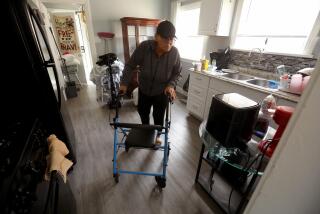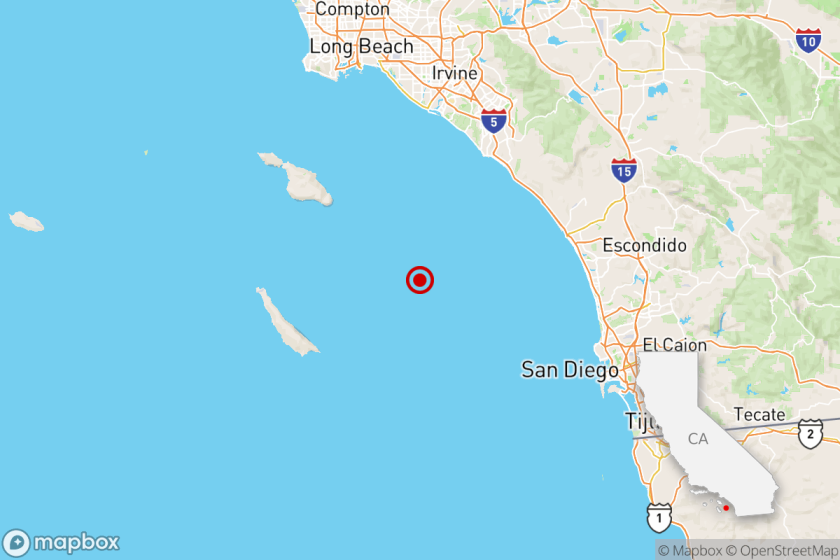BAY AREA QUAKE : Frantic Search Ends at the Morgue
RICHMOND, Calif. — When the quake hit Richmond, a gritty, working-class town at the northern end of the East Bay, Barbara Chub Fortune was awaiting her daughter’s return home from work. Washing dishes in her kitchen, she felt the tidy, two-story stucco house tremble violently, then settle again to stillness.
At once she became eager for her daughter’s arrival--they’d have something wild to talk about.
“I was contemplating going to my night class, but I decided to stay here and share this with Tarrann,” she said. “We talk about everything.”
Tarrann Fortune, 28, an engaging, strikingly attractive social worker who worked in Oakland, had moved back home after a divorce. By 5:30, 26 minutes after Tuesday’s massive earthquake, her mother was listening for her car.
Instead, she heard the phone. Eleven-year-old Jarrell Summerhill, one of her grandchildren, wanted to know if his Aunt Tarrann was there. He reported something disturbing: He thought he had seen her on the TV news, lying on the ground, maybe hurt.
It would turn out that the youngster was mistaken. But the call sent the first prickling wave of fear through Barbara Fortune.
“I knew Tarrann was on that freeway--I thought about it then,” she recalled Friday, nursing a brandy and ice as she sat in her housecoat, fretting numbly over the Nimitz Freeway collapse. Nearly three days had passed, a tunnel of time filled with wrenching despair, a nervous, aching dread. She, like many others, was still awaiting word on the fate of a loved one.
As each hour passed, the odds worsened. She would rather wait than hear bad news. “That way I can still hope,” she said. “I’d be hoping six months from now.”
Even so, it was difficult. Her former husband, James Fortune Sr., had been down at the broken freeway, hollering vainly for his daughter in the dusty jumble of concrete. He had combed streets, hospitals, the coroner’s office, made dozens of phone calls.
“James can’t look no more,” Barbara Fortune said sadly, seeming to sense the tragic news that lay ahead. “He’s not eating. He’s exhausted.”
Tall, slender James Fortune Sr., a San Francisco Giants fan who fathered four children before his divorce several years ago, arrived at his former wife’s house about 8 p.m., three hours after the quake.
Although Barbara had cooked--Louisiana gumbo--neither had eaten. They drove south to Oakland, where their daughter worked at the Alameda County complex. Their destination was Merritt Hospital, one of three hospital buildings atop a knoll nicknamed “Pill Hill.”
When they learned that Tarrann was not there, they hit the other two hospitals in turn, then drove to the county trauma center, Highland Hospital, which is also in Oakland.
There were no unidentified young black women housed there. The only Fortune was a man, Eugene. They were invited to keep checking.
It was nearly 11 at night when the Fortunes arrived home. Barbara tried to get James Sr. to eat. But neither did; they only waited.
At 1 a.m., he decided to stay over in his daughter’s room. The room reflected her strong Catholic convictions; on the black lacquered desk were two versions of the Bible. Her father stretched out under the brass headboard and fell asleep.
“I thought he’d get some comfort sleeping in her bed,” Barbara Fortune said.
But she stayed up. She paced upstairs, from kitchen to dining room to living room--a straight line back and forth past the big console television, covered by a forest of family photographs.
In one of those pictures, a 10-year-old Tarrann beamed brightly in pigtails.
Her mother walked all night.
Robin Harris, Tarrann’s 30-year-old sister, had been shopping in the suburb of Vallejo several hours before the quake. She had remarked to a friend about the heat--Indian summer weather.
“Earthquake weather,” her friend answered.
They were driving when the 6.9-magnitude temblor struck, inexplicably causing the car radio to go out. They kept pushing buttons--nothing. At 5:30 they arrived at the friend’s house and saw the first television footage.
“When they said the (freeway) collapsed, I got delirious,” Robin Harris said. “I knew my sister gets on that freeway at that time (of day). Something in my heart told me my sister was on that bridge.”
On Wednesday morning, Robin Harris and a friend, Creola Cunningham of nearby Fairfield, drove to her mother’s tan, gray-trimmed house near Richmond’s busy San Pablo Avenue, the family’s home for 17 years. Barbara Fortune was not doing well. She phoned her doctor and was given a prescription for a sedative.
“I’ve never had a sedative at all,” she said later. “We don’t take drugs. I had nothing in the house, not even pain pills.”
Barbara called the car dealership where Tarrann bought her silver 1988 Volkswagen Fox, trying to get the license plate number so authorities could track her. But the plate number wasn’t available--only an engine identification number.
Robin Harris and her friend decided to drive to Oakland. Tarrann’s job as a social worker, assisting the city’s poor, forced her to keep irregular hours. They thought that co-workers might have seen her or, if she were dead, that the coroner’s office next door might have her body.
James Sr. and 26-year-old James Jr. left about the same time in a separate car. They planned to search elsewhere in Oakland.
Barbara Fortune stayed behind near the phone.
“I couldn’t go,” she said. “I didn’t want to see.”
On the way to Oakland, Robin Harris stopped at a DMV office. Under newly adopted restrictions, they were told, they could not obtain Tarrann’s license plate number. At the county building they had better luck. Tarrann had registered her plate number in signing up for a county parking space.
But co-workers had not seen or heard from her all morning. They did not seem to know if she had left early or late the previous night.
“They told me to look through her desk . . . to check her calendar . . . and see if she had any appointments,” Harris said. “She didn’t.”
At the county coroner’s office, Harris asked if any Jane Does matched Tarrann’s description--tall, pretty, shoulder-length dark hair brushed full, fine sharp features. No such bodies had come in.
Harris jotted the physical description on a missing-persons report.
Half an hour later, James Fortune Sr. walked into the same coroner’s office, unaware that Robin Harris had been there. He was wearing a Giants cap, looking grim, his jaw clenched. His hands were shoved deep in his jeans pockets.
“I’m very frustrated,” he said, standing in line with his son. “I’ve been nauseated and nervous. I’m even shaking a little now.”
As they prepared to walk out, James Jr. said bravely, “Let’s go, man, I’m ready to go find my sister.”
James Sr. looked around on the way out. “I hope I don’t have to come back here.”
By now, the extent of the Nimitz collapse had been widely reported. More than a mile of the double-deck freeway had collapsed on itself in west Oakland, the southbound top lanes falling onto the northbound lower level.
Tarrann Fortune had been commuting on the freeway for nearly four years, taking that lower level about eight miles each night from Oakland to Richmond. She was a particularly sweet, religious young woman who liked to spend lunch hours at Catholic worship, her mother said. She was also spontaneous, unpredictable--a woman who liked to drive fast, who married a Richmond man in June, 1987, only to separate by Christmas of that year.
“She drives fast, but she don’t rush,” her sister said. “She don’t rush to dress. You call her in the morning to take you to the store, she wouldn’t get there till night--but she’d get there.”
The desperate hope was that, somehow, that unpredictable side of her had altered her routine, had taken her somewhere far from the Nimitz.
James Fortune Sr. went down to the freeway in the afternoon after leaving the coroner’s office. He surveyed the awesome destruction and hunted for places where someone might have survived.
“Tarrann!” he shouted over and over. “Tarrann!”
The TV was flashing hot line numbers--shelters, hospitals, missing-persons information. Barbara Fortune kept dialing. And so did others.
Tarrann’s sister, Robin, learned that the coroner had just received the bodies of five black females. She was asked to give the office a little time and to call back.
She waited two hours. None was Tarrann.
In the late afternoon, James Sr. came home sounding hoarse.
Barbara took her sedative. She also poured herself a brandy, then another, then another--six in the course of the evening.
“I can’t even feel it,” she said. “I ain’t even drunk.”
But she slept.
On Thursday, there were more phone calls. A list had been drafted of the 11 hospitals near Oakland and Richmond. Every two hours, two or three were called as a routine began to develop.
At one point, Barbara Fortune spoke to Dennis J. Curley, a co-worker with Tarrann at the county.
Had he heard about anyone being stuck in elevators? she wanted to know.
Curley gave her a pessimistic report. He had talked with another co-worker who had seen Tarrann leaving the parking lot Tuesday night, less than 20 minutes before the quake. The co-worker and Tarrann had reached the lot exit simultaneously, and she had honked to him as he let her out first.
Then she sped away. The co-worker, who saw her get on the freeway, was far behind when the quake hit. He was able to stop before the point at which the second level fell down; he was not injured.
The calls to hospitals continued.
Robin Harris, her boyfriend Ronnie Bay, a few family friends and Barbara Fortune milled around, chatted, made calls.
It was now Friday afternoon. Barbara was sipping another brandy. The phone rang again and she spoke into it bitterly about Oakland Mayor Lionel Wilson and the freeway. “I am sick of (him). My child could have been saved if someone had taken the initiative and fixed that freeway. The reason they don’t care about the Nimitz and never fixed it is because it’s only black folks that live in west Oakland.”
A discussion--nearly an argument--broke out over whether Tarrann were still alive.
“She’s all right,” Bay said. “She’s lost in a hospital somewhere . . . ain’t no doubt.”
“She ain’t in a hospital,” Harris countered. “She’s up under the freeway.”
“I hope she’s in the hospital,” Bay persisted, “with a concussion and don’t know who she is.”
Barbara Fortune speculated that they might not know for a few more days. “It might be the last car they get to.”
But it wasn’t a few more days. The coroner’s call came that evening at 5--three days, almost exactly, after the quake hit.
Tarrann’s car had been found far beneath the rubble, right where one section of the upper level had broken off.
Her sister, Harris, seemed to take it the worst, crying all night.
On Saturday morning, even as rescue crews were pulling a 57-year-old survivor, Buck Helm of Weaverville, from the wreckage of the Nimitz, the Fortunes began to think about funeral arrangements, about picking up Tarrann’s purse and its belongings from the coroner’s office.
“I know she’s in Heaven. He got a good one up there,” Barbara Fortune said.
She spoke in a tight, controlled voice; she’d had her sedative, perhaps a little more brandy as well, and for now, at least, she was OK.
“Right now I can accept it,” she said, and occasionally her voice began to break. “It’s like she’s right here, petting me on the shoulder, saying, ‘It’s all right, Mama.’ ”
More to Read
Sign up for Essential California
The most important California stories and recommendations in your inbox every morning.
You may occasionally receive promotional content from the Los Angeles Times.











